#presocratic philosophy
Text
THE WORLD OF PARMENIDES – ESSAYS ON THE PRESOCRATIC ENLIGHTMENT by Karl Popper
On the traces of our thinking - Part One

„Bright in the night, with an alien light,
Round the Earth she is drifting.
Always she wishfully looks
Out for the rays of the Sun.”
Philosopher of Science Sir Karl Raimond Popper admired the Presocratic philosophy throughout his lifetime.
Popper considers the Presocratic speculations and cosmogony as the beginning of our history of science, especially with regards to epistemology and theoretical physics.
It is believed that speculative philosophy began with the Ionians, including Thales of Miletus and his disciple Anaximander. They developed the method of critical approach or critical tradition: To approach an explanatory myth (critical revision of mythical poems such as Homer or Hesiod’s "Theogony") with critical eyes.
Even today, the verification of a theory for its truthfulness is a special feature of science.
However, one should not underestimate the importance of incorrect theories, which were able to justify the problem and refine the explanation in the first place through falsification,
since they can lead to a finer awareness of the problem again through the refutation.
With this following book, Popper wants to contribute to a better understanding of the Presocratic.
In addition, he wants to illustrate with his explanations the thesis that "history is- or should always be, the history that serves to solve the problem (...)."
Popper discusses the basic ideas of the early Greek philosophers and shows the development of a critical methodology with the legacy of the search for truth, illustrated in particular by the didactic poem by Parmenides and the parable of the two paths.

The importance of Presocratic ideas in today's science is found in the reconciliation and unification of contradictory assumptions: Nothing changes (Parmenides) and everything changes (Heraclitus).
But how is change possible in the first place and how do we come to knowledge?
It is a remarkable intellectual achievement to define different forms of knowledge and to distinguish intellectual thinking from knowledge in general.
The revelation of the goddess (Ananke? Dike?) is a journey to the real and deceptive world.
An experience of rapture must have distorted Parmenides' reality of life in such a way that he depicted this lightning-like illumination in this dualistic conception.
The goddess, who describes the human world as false and deceptive, wants to reveal to Parmenides the secret truth about nature and reality, but also the false opinions of mortal men.
As mentioned above, the dualistic concept can also be found in the textual form: The poem is divided into two parts and begins with an introduction (Proömium).
The first path is described as the Path of Truth (or the Path of True Knowledge) and the second path as the Path of Human Conjecture (Path of Conjectural Knowledge).
The second part has survived only in fragments, the incompleteness is illuminated by Plutarch's reports, whereas the first part caused a sensation and was often quoted and copied.
In the first part, "The Path of Truth", the Goddess presents a radically rationalist and anti-sensualist epistemology and then leads to a purely logical proof, culminating in the thesis that there can be no movement and that the world is in truth made up of a motionless, gigantic, homogeneous and massive spherical block where nothing can happen: Neither past nor future.
This world stands in sharp contrast to the world of apparitions in part two, The Path of Human Conjecture.
This is the world as ordinary mortals experience it, the rich and varied world of movement, change, development, the colourful world of opposites, the world that distinguished night and light.
Dualistic-World-Concepts arise from the preoccupation with the question of the first substance, or in this particular case, one assumes a twofold building material (e.g. spirit > < body ; subject > < object).
“Listen! And carry away my message when you have grasped it!
Note the only two ways of inquiry that can be thought of:
One is the way that it is; and that non-being cannot be being.
That is the path of Persuasion, Truth’s handmaid; now the other!
The path is that it is not; and that it may not be being.
That path- take it from me! – is a path that just cannot be thought of.
For you can’t know what is not: It can’t be done; nor can you say it.”
[Character limit :/ ...text continues in the second part]
#Presocratic philosophy#cosmogonic questioning#ontology#epistemology#philosophy#literature#Karl Popper#Popper#philosophy of science#scientific research#history of theories#metaphysics#Parmenides#Heraclitus#substance and being#theories of conscience#eternal truth#ancient philosophy#ancient wisdom#ancient scepticism#knowledge#real knowledge#Entrückungsmoment#Xenophanes#Eleatische Schule#Ionische Schule
2 notes
·
View notes
Text
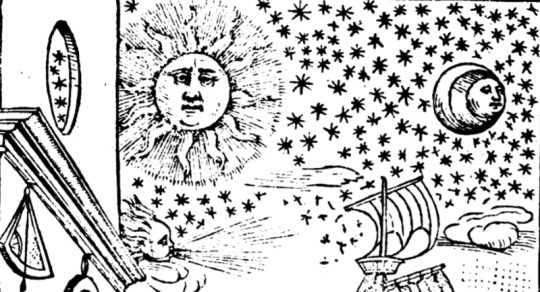
Hylozoism is the philosophical point of view that matter is in some sense alive. Hylozoism refers largely to views such as those of the earliest Greek philosophers (6th and 5th centuries BC), who treated the magnet as alive because of its attractive powers (Thales), or air as divine (Anaximenes), perhaps because of its apparently spontaneous power of movement, or because of its essentiality for life in animals. The theory holds that matter is unified with life or spiritual activity. Thales, Anaximenes, and Heraclitus all taught that there is a form of life in all material objects. It was Thales who maintained that all things are full of gods (daimon).
#philosophy#matter#presocratics#presocratic philosophy#thales#heraclitus#hylozoism#Anaximenes#material imagination
20 notes
·
View notes
Text
We should not act and speak like ones who sleep.
οὐ δεῖ ὥσπερ καθεύδοντας ποιεῖν καὶ λέγειν.
-Heraclitus, fr. 73 Diels-Kranz
#classics#tagamemnon#Greek#Greek language#Ancient Greek#Ancient Greek language#translation#Greek translation#Ancient Greek translation#Ancient Greece#ancient philosophy#Heraclitus#Presocratics#quote#quotes
123 notes
·
View notes
Photo
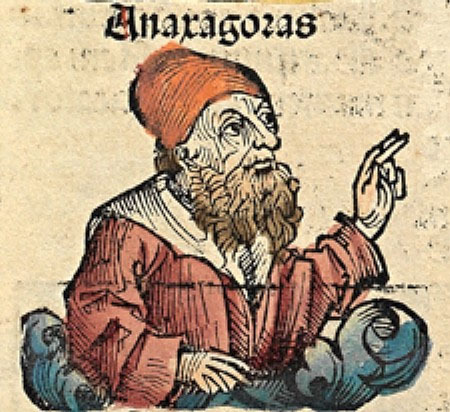

Anaxagoras of Clazomenae – Scientist of the Day
Anaxagoras of Clazomenae, a Presocratic natural philosopher, lived from about 510 BCE to around 430 BCE, so he was philosophizing about 40 years earlier than Socrates and 80 years before Plato.
read more...
#Anaxagoras#presocratics#natural philosophy#ancient Greece#pluralists#histsci#histSTM#5th century BCE#history of science#Ashworth#Scientist of the Day
22 notes
·
View notes
Quote
Blessed is he who possesses wealth of divine intelligence
but wretched is he whose concern is a dim opinion about the gods.
Empedocles of acragas (Clement, Miscellanies 5.140)
23 notes
·
View notes
Text
I love the Goncharov meme conceptually. It feels like classic academia perhaps, definitely like studying ancient philosophy at times. You get a fragment (knockoff boots), a general context (Martin Scorsese films existing), and then a very long discussion about nothing starts. But the nothingness isn't entirely nothing, and there are still limits to what can and cannot be said framed by both the existence and non-existence of that which is being discussed. Hilarious, truly, and the fact itself so very interesting to analyse in so many ways.
#This feels a bit like studying and discussing presocratics or Socrate himself xD#ngl while I loved the boots thing (I had often thought about those knockoff boots‚ I found them hilarious)#I don't find the Goncharov memes particularly funny#But the concept is fascinating conceptually and thrilling to analyse in so many levels#The fact that almost every webwaving‚ even the ones about a fake film‚ have the same quotes#That basically everything said about this film is what is said about any other popular media#Is so interesting as how short media analysis falls into superficiality and miopic repetition of patterns#As is the fact that we can discuss to eternity something that doesn't exist#in a sort of Narcissus looking at his reflection on the pond situation‚ in love with our own discussion more than the thing itself#And that's a level. But it's also very interesting in how basically everyone has a very similar idea of what the film is about#How nothingness with sprinkles can tell us something‚ a lot‚ and make a ghost of a film which can effectively to some extent be analysed#It's also hilarious in how it puts a mirror‚ so to speak‚ in front of so many academic studies#How we've basically been doing this for centuries unironically and I'd say with at least a certain sense of self awareness#How this brings back studying and discussing the lost texts of Ovid or Sappho based just on what they say about them or the absence#in what they say about them‚ or what other authors say about them or how their works are wrapped around those lost texts#How it brings back the study and analysis of presocratics like Pythagoras or even Socrate himself of which we have Plato and Xenophon#but really something close to nothing considering how important those authors are as basis of the entire history of western philosophy#And yet there's honestly so much to say about them given the nothingness we have accompanied by the something!#And Goncharov memes work a bit that way#I don't know. There are really so many facets to this meme and they are all conceptually hilarious yes xD#Another but not less important aspect of this meme that I love conceptually is that#I'm a bit fan of funny lies. I adore them. Especially when constructed between several people#And Goncharov is precisely that lol#Goncharov#I talk too much#I should probably delete this later#Meme shit
34 notes
·
View notes
Text
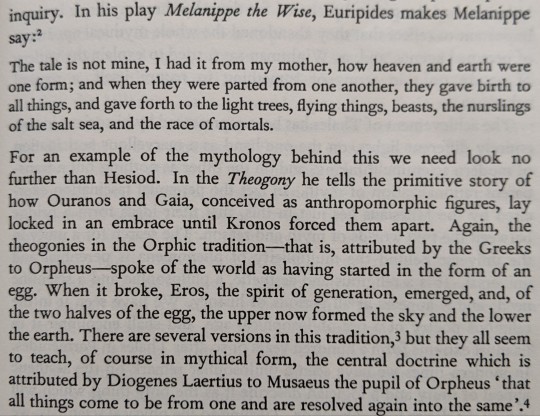
W. K. C. Guthrie, A History of Greek Philosophy I The earlier Presocratics and the Pythagoreans
#i have always loved this idea everything is one we contain multitudes as whitman says and the greatness of his poem is i a m everyone i am#all we are all we are me like violeta parra says el canto de todos que es el mismo canto#ugh#cosmogonía.#words#books#book quotes#quotes#greek stuff#greek philosophy#philosophy#presocratics#orphism#cosmogony#euripides#classics shit#~just a sinner.
8 notes
·
View notes
Text
To God all things are fair and good and right, but men hold somethings right and wrong.
Heraclitus Of Ephesus, Fragment 102.
#philosophy tumblr#philoblr#Ionian philosophy#greek texts#the ancients#presocratics#heraclitus#metaphysics#organized religion#God#humanity#morality#dark academia#life quotes
23 notes
·
View notes
Photo
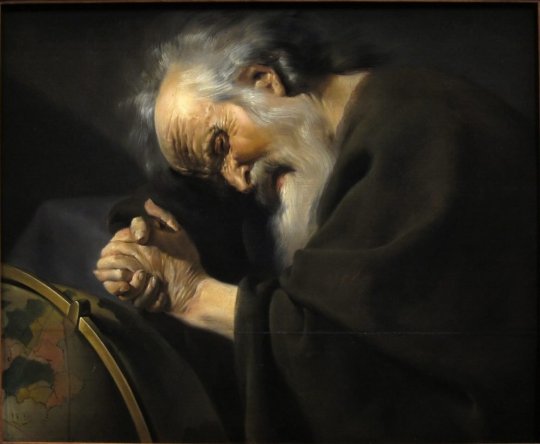
Heráclito
Johannes Moreelse
12 notes
·
View notes
Text
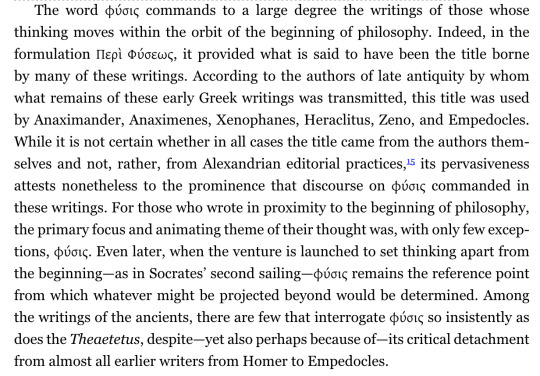
John Sallis, The Figure of Nature: On Greek Origins
1 note
·
View note
Text
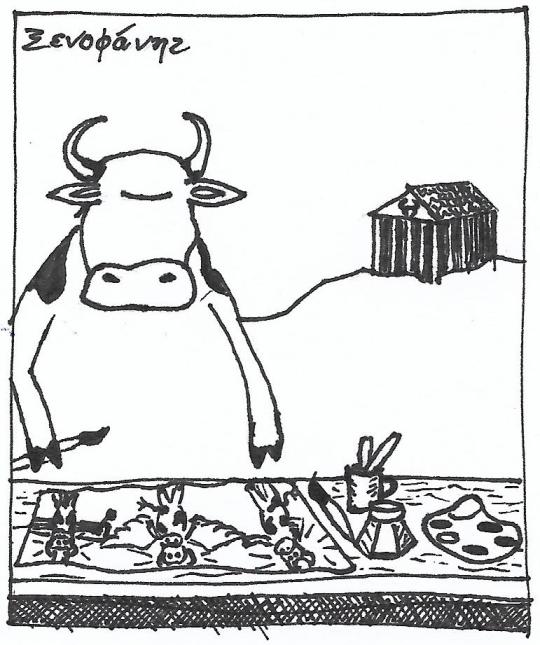
Cow gods
#philosophy memes#context: xenophanes criticized anthropomorphic conceptions of divinity as mere self projection; arguing that#“If cows and horses or lions had hands and could draw; then horses would draw the forms of gods like horses; cows like cows”#– G. S. Kirk; J. E. Raven; and M. Schofield (eds.); The Presocratic Philosophers; 2nd edn. (1983); fragment 169#via A. Kenny; A New History of Western Philosophy; 1st edn.; vol. 1 (2004); p. 289
6 notes
·
View notes
Text
THE WORLD OF PARMENIDES – ESSAYS ON THE PRESOCRATIC ENLIGHTMENT by Karl Popper
On the Traces of our Thinking - Part Two

What achievements have resulted from Parmenides theories for modern physical and mathematical science?
-> On the one hand, he was the discoverer of the deductive method of proofing and, indirectly, of the hypothetical-deductive method.
-> Parmenides emphasized that the unchangeable or immutable, could be self-explanatory and so also used as a starting point for explanation. This lead, according to Meyerson, to a search for Laws of Conversation, Law of Conservation of Energy and Conservation of Momentum. The same applies to the method of representing natural theories or laws of nature in the form of mathematical equations.
-> The theories of Parmenides were the beginning of the Theory of Continuity of Matter and so the starting point of Cosmological and Physical School and their ongoing rivalry against Atomistic School.
(from the question of the structure of matter to Schrödinger and modern quantum field theory)
-> Aristotle calls Parmenides the indirect forerunner of the Greek Cosmological School of Atomists (Democritus and Leucippus developed their teachings by refuting Parmenides point by point, and so the deductive system became a hypothetical-deductive system, it is seen as the first falsification of a deductive system; Falsity of Parmenides’ conclusions = Falsity of his premises)
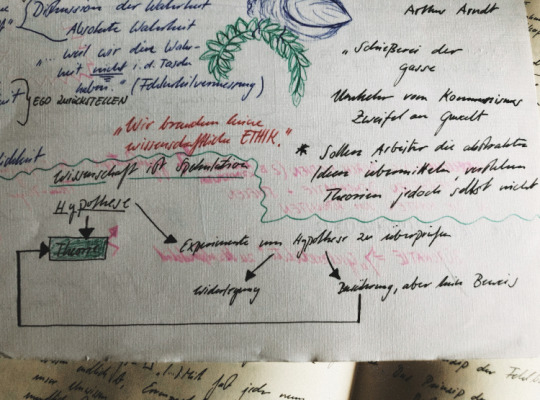
Nevertheless, we should not forget that Parmenides is not the original author of all the ideas presented.
As a disciple of the founder of the School of Elea, Xenophanes (~ all conceptions of the Gods are anthropomorphic and culturally contingent + Believe in Absolute Truth ), he shared the theory of an ontology that any philosophical doctrine that assumes an absolute being, which can only be grasped by thinking and this absolute being opposes with becoming (because the absolute being “is”) and the visible world as an illusion.
The cosmogony is influenced by his first teacher Ameinias, who connected ideas of Anaximander, Pythagoras, Pherekydes…
What was extraordinary about the school was the culture of debate and the phenomenon that the student was ambitious to correct and/or develop ideas of the teacher.
Again, we have the importance of incorrect theories for the further development of (scientific) explanations.
"Do we know more today, or have we just heard that there is more knowledge?"
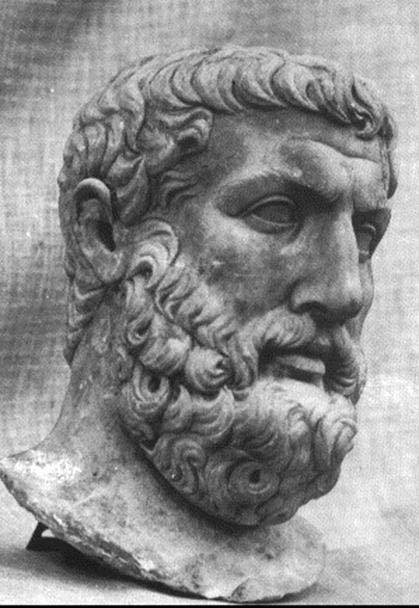
It was an exciting journey with Popper to the pre-Socratic ideas. The Socratic postulate of not-knowing also includes the idea of intellectual modesty.
Each new achievement is a small step towards the truth, but also only a hypothetical solution to a scientific problem. In addition, with each achievement, the amount and degree of its difficulty also grows.
Science does not contain certain knowledge, it is always revisable, improvable and as a verifiable conjecture, only conjectural knowledge.
What I personally find particularly fruitful about Popper is that he can show so clearly and unambiguously (without religious haze) that even science, with its methods and models, is not an incontrovertible guarantor of truth.
It is even extraordinarily unscientific to consider a theory to be irrefutable.
Science must not serve as a henchman of industry and make its services dependent only on fashions and currents.
Based on ethical principles, science should be at the service for coming nearer to the truth.
Since Newton we are collectively confusing science with truth: The world of illusion and presumption (doxa or the Path of Human Conjecture) has become the “kingdom of the scientific truth”.
But scientific research is an eternal quest: A quest to understand ourselves and the world(s) we live in better, a constant revision for better explanations, which will also be falsified as obsolete at some point of realization.
But to what extent a realization is correct, which epistemology seems the most sophisticated for this operation? What can really be and what is being? What IS at all?
I would like to end with a new-learned term that was first used by Xenophanes in the sense of "truth-like": ἐοικότα.
Perhaps, in our thoroughly rationalized world, we cannot accept that humanity's biggest questions have become no less complicated. It is sad that most human-beings prefer to make false assumptions instead of having the tolerance not to judge hastily, to not name something and alas putting sensualism above metaphysical thoughts, because materialism is cognitive the easiest to grasp.
“But as for certain truth, no man has known it,
Nor will he know it; neither of the Gods
Nor yet of all the things of which I speak.
And even if by chance he were to utter
The perfect truth, he would himself not know it;
For all is but a woven web of guesses.”
#Presocratic philosophy#cosmogonic questioning#ontology#epistemology#philosophy#literature#Karl Popper#Popper#philosophy of science#scientific research#history of theories#metaphysics#Parmenides#Heraclitus#substance and being#theories of conscience#eternal truth#ancient philosophy#ancient wisdom#ancient scepticism#knowledge#real knowledge#Entrückungsmoment#Xenophanes#Eleatische Schule#Ionische Schule
1 note
·
View note
Text
“The everlasting and exclusive coming-to-be, the impermanence of everything actual, which constantly acts and comes-to-be but never is, as Heraclitus teaches it, is a terrible, paralyzing thought. Its impact on men can most nearly be likened to the sensation during an earthquake when one loses one’s familiar confidence in a firmly grounded earth. It takes astonishing strength to transform this reaction into its opposite, into sublimity and the feeling of blessed astonishment. … Ordinary people fancy they see something rigid, complete and permanent; in truth, however, light and dark, bitter and sweet are attached to each other and interlocked at any given moment like wrestlers of whom sometimes the one, sometimes the other is on top. Honey, says Heraclitus, is at the same time bitter and sweet; the world itself is a mixed drink which must constantly be stirred.”
—Friedrich Wilhelm Nietzsche, Philosophy in the Tragic Age of the Greeks
In 2018 I (masochistically) read all of Nietzsche’s works in chronological order. Yet I missed the “most important book Nietzsche never wrote,” a book on pre-Platonic Greek philosophy. It survives unfinished, in the form of extended notes. And it’s truly extraordinary, especially the rhapsodic sections on Heraclitus.
#friedrich nietzsche#literature#philosophy#pre-platonic philosophy#presocratic philosophy#Heraclitus#oceanic feeling#nietzsche
9 notes
·
View notes
Text
For humans to get all they wish would not be for the better.
ἀνθρώποις γίνεσθαι ὁκόσα θέλουσιν οὐκ ἄμεινον.
-Heraclitus, fr. 110
#classics#tagamemnon#Greek#Greek language#Ancient Greek#Ancient Greek language#translation#Greek translation#Ancient Greek translation#ancient philosophy#Heraclitus#Presocratics#fragment
67 notes
·
View notes
Text
The Presocratics: Diogenes of Apollonia
Diogenes of Apollonia
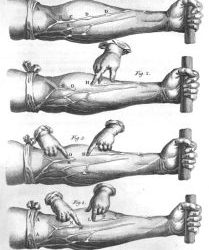
Diogenes was located by researchers to be living in the Thracian town of Apollonia in modern day Sozopol in Bulgaria. The town was started by Milesians, leading to conclusions that Diogenes was influenced by the Ionian school of pre-Socratics. In a way, he was an apotheosis of the pre-Socratics, where there was a need to harmonize the prior systems into one system in the 5th century BC. "In my opinion, a person beginning any discourse must present a starting point that is indisputable, and an explanation that is simple and serious." His influences in particular would include Anaximenes, Heraclitus, Anaxagoras, and Leucippus.
Similar to Heraclitus, Diogenes wanted a single substance where all other substances could be derived from, and instead of Fire, he followed Anaximenes with Air as the origin of all things. "In my opinion, to sum it all up, all things that are, are differentiated from the same thing and are the same thing...If any [indivisible elements] were different from another, being different in its own nature, and if it were not the case that being the same thing it changed and was differentiated in many ways, they could not mix with each other in any way, nor could help or harm come to one from another, nor could a plant grow from the earth, nor an animal or anything else come to be, unless they were so constituted as to be the same thing. But all these things, being differentiated out of the same thing, come to be different things at different times and return into the same thing."
By adding intelligence to air, like Anaxagoras's Nous, or Heraclitus's Logos, he could simplify things and put it all into one. Intelligence for Diogenes was evidenced in the usefulness of the seasons, weather, and cycles of day and night. That regularity and dependability of nature for life gave ancient people an appreciation of natural intelligence, even if things weren't perfectly dependable. Instead of intelligence correlating to how much Nous collected in structures, Diogenes preferred cold for the inanimate and warmth for the animate in nature. This allowed for changes in perception while keeping the same substance. "For without intelligence it could not be distributed in such a way as to have the measures of all things—winter and summer, night and day, rains and winds and good weather...As they are arranged, they are as good as possible...Humans and animals live by means of air through breathing. And this (air) is both soul and intelligence for them, and if this departs, they die and their intelligence fails...In my opinion, that which possesses intelligence is what people call air, and all humans are governed by it and it rules all things. This very thing is god, and it reaches everything and arranges all things and is in everything. There is no single thing which does not share in this, but no single thing shares in it in the same way as anything else, but there are many forms both of air itself and of intelligence. For it is multiform—hotter and cold, drier and wetter, more stable and possessing a sharper movement, and unlimitedly many other alterations are in it, both of flavor and of color."
Diogenes was very interested in anatomy. It was said that his book On Nature had "an accurate anatomy of the veins." Because air was associated with breathing, lungs, blood and veins, body temperature was a sign of intelligence, but the highest intelligence need not be exemplified by the sun. "All sensation is caused by air, air from the outside meeting and mixing with, or simply agitating, air in the sense-organ itself or in the brain, whither it is led by blood-channels from the sense organ. Clarity of perception depends on the fineness of the air in the body and the fineness and directness of the blood-channel by which the air is conveyed. Apparently the air is mixed with blood on its journeys through the head; when air naturally permeates the blood throughout the body, pleasure is produced. Thinking depends on pure, dry air; it is not clear from exactly where or how this functions, but Simplicius tells us that air mixed with blood and pervading the body through the blood-channels produces thought (being distinguished from pleasure, presumably by its purity, dryness and warmth). One may compare Anaxagoras' Mind, which was 'purest and finest of all substances' and Heraclitus' soul-fire; in Diogenes, as in Heraclitus, moisture (again) quenches or inhibits intelligence. Differences of intelligence and of animation are explained partly by differences of surrounding air (that near the ground is moist and heavy, therefore plants have a very low degree of life), partly by differences of bodily structure (birds cannot properly assimilate their pure surrounding air)."
Cosmology for Diogenes derived from prior philosophers. It was "dependent on Anaxagoras (for the idea of the noetic substance starting a vortex) and on the Milesian tradition (the dense coalescing at the centre to form earth, the rarer material going to the extremity, by like-to-like and differentiation)...Air is the element. There are unlimited worlds and unlimited void. The air by being condensed and rarefied is generative of the worlds. Nothing comes to be from or perishes into what is not. The earth is round and is supported in the center (of the cosmos) and has undergone its process of formation through the rotation resulting from the hot and the solidification caused by the cold." In a way, pre-Socratics could observe snow and ice melting into water and also see water evaporate into a mist. Those temperature reactions gave a clue about chemistry and showed that the one "element" could become solid, melt, or turn into a gas, so one didn't need more elements to combine, but just an extrapolation could be an example that could explain everything. For example an observation of lava solidifying into rock, while also releasing gases when extremely hot, would make an impression on the ancients.
Sooner or later, an ethical conundrum appears with these pre-Socratics, which is usually concerned with well-being. "Pleasure and pain arise in the following manner: pleasure whenever a large amount of air is mixed with the blood and makes it light, being in accordance with its nature and penetrating the whole body, and pain whenever the air is contrary to its nature and is not mixed, and the blood coagulates and becomes weaker and denser. Thought, as was said, is due to air that is pure and dry. For moisture hinders the mind. For this reason thought is diminished when we are asleep, drunk, or full...This is why children are foolish...They are also prone to anger and in general easily roused and changeable because air, which is great in quantity, is separated by small intervals. This is also the cause of forgetfulness: when the air does not go through the entire body, people cannot comprehend."
Like any debate in naturalistic philosophy, there may not seem to be much of a danger in getting things wrong. Even if the galaxies are ordered differently than a theory lays out, one still has to get on with life and try to survive along with others just the same. The problem of well-being is that one cannot ignore what is wrong for too long without painful consequences. Arguments could get out of hand due to the sheer ignorance of the times, but one knows right away if one is feeling better or worse. Arguments could also be more or less persuasive depending on the information being revealed as well as the information left out. Diogenes' need to systemize past philosophers led naturally to debates on how to prioritize ideas and how to expose contradictions and weaknesses in arguments.
An Opening for Sophistry

In the later half of the 5th century BC, Athenians experienced a defeat at the hands of the Spartans, and like any big cultural changes in life, they were exposed to a different point of view. Sophists sprung up around this time and advocated a more relativist point of view and saw how leaders shaped speech to make contrary values seem appealing. Even the pre-Socratics were stuck in theory, and depending on how persuasive, or how lazy an audience might be, any theories will naturally have gaps in evidence that people are willing to accept without question. When a theory is accepted widely, it stays accepted until human endeavor finds an obstacle that exposes a contradiction. Some theories last for centuries before empiricism can catch up.
Speaking well was seen as important for public speaking in front of assemblies or law courts. Even today, a good lawyer has to be able to present a weak case to the best of his or her ability. The sophist Protagoras once advised to "make the weaker argument (logos) the stronger." He also understood the power of culture, values, and preferences. "A human being is the measure of all things—of things that are, that they are, and of the things that are not, that they are not...There are two opposing arguments (logoi) concerning everything." There was of course an importance for education and practice. Without memorization, one could not recall important arguments and points fast enough for a rejoinder. "Education is not implanted in the soul unless one reaches a greater depth." Of course, the problem with depth is that the universe and its complexity contains endless depth, hence for the need to have endless clarification.
Gorgias made a famous case against mathematics and abstraction in a long argument that looks like a mixture of Eleatic philosophy, Nagarjuna's formless exercises, and the scene in the movie The Shining, "all work and no play makes Jack a dull boy." By the end he simply proves that abstraction is at best a pointer to what is sensed, but any gaps in the logos provide observation an opportunity to discover sensorial detail that may prove the logos wrong. He also found that emotions could manipulate audiences to favor one argument over another. "Gorgias said that one should destroy the seriousness of one's opponent with laughter, and his laughter with seriousness."
Mindfulness: Nirvana: https://rumble.com/v1grcgx-mindfulness-nirvana.html
Antiphon also defined different kinds of laws. There are those laws of nature that can't be negotiated with and then those with humans that are negotiated. Laws then could be altered based on well-being and values, which people do not agree upon and constantly war over. "[Bad laws] permit people to suffer more pain when less is possible and to have less pleasure when more is possible, and to receive injury when it is not necessary." These are the reasons why obedience or rebelliousness could be either good or bad depending on their justifications and the quality of the laws being judged as fair or unfair. This isn't to say that nature by itself is better than man made laws in every situation. Sometimes it's the opposite. Critias argued that "there was a time when human life was without order, on the level of beasts, and subject to force; when there was no reward for the good or punishment for the bad."
The complexity in the senses and the logic trying to understand reality led to so many debates that it became a form of entertainment, but the ethical problem of getting things wrong bothered Socrates who popularized a cross-examining, questioning style, to use an algorithmic will-power to reach a more lasting answer to difficult questions. This is the beginning of the Socratic period.
The Presocratic Philosophers - Kirk & Raven: https://www.isbns.net/isbn/9780521274555/
A Presocratic Reader - Richard McKirahan: https://www.isbns.net/isbn/9781603843058/
Philosophy: http://psychreviews.org/category/philosophy03/
0 notes
Text
τοῦ λόγου δὲ ἐόντος ξυνοῦ ζώουσιν οἱ πολλοί
ὡς ἰδίαν ἔχοντες φρόνησιν
[Though wisdom (logos) is universal, the many live as if they have insight of their own]
— Heraclitus I. p. 77. Fr. 2.
0 notes